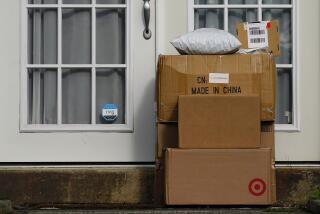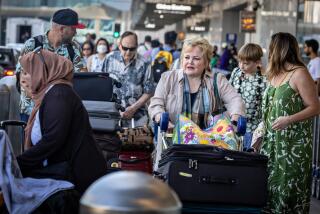Take a new tack on packing as luggage searches intensify
- Share via
Stacy Kulig lost her luggage innocence in San Diego.
Picking up her bag at the airport after a flight from the East Coast about three weeks ago, the Washington, D.C.-based meeting planner found a note saying federal inspectors had hand-searched it.
“I thought, ‘Wow -- they really are doing it,’ ” she said. “I didn’t realize they went into that detail.”
Many travelers are just now waking up to the fact that the Transportation Security Administration can and will open their checked luggage and rummage through its contents. Since Jan. 1, all U.S. airports have been screening every piece of checked baggage, the TSA says.
The chances of your luggage being opened vary by airport, airline -- and what you’re packing.
Most airports, including LAX, screen checked bags electronically, by X-raying the bag or examining it for explosive-chemical residues. If these electronic means detect anything suspicious, inspectors hand-search the bag. At a few airports that lack detection machines, your bag probably will be hand-searched, among other methods.
On a recent visit to LAX, I noticed only one or two bags that appeared to have been opened. But John Alpine, a software company executive in Fort Collins, Colo., who flies as many as 200,000 miles a year on business, says, “Probably every time I’ve checked luggage at the Denver airport, they have opened it.” (He thinks an oddly shaped travel clock may trigger the machines.)
In interviews, travelers’ reactions to the hand search ranged from “I think it’s invasive” to “If they want to search through my dirty skivvies, let ‘em have at it.” Several say they are happy to put up with any search that could thwart terrorists.
But many are uneasy with the thought of strangers pawing through their belongings. The searches also pose issues that are still being worked out: Who is responsible if something is missing? Can you reduce chances of a hand search? Should you lock your luggage?
Here are some answers and strategies:
* To lock or not: The TSA suggests that travelers unlock their checked bags before they are screened or use removable cable ties, although they are not required to do either.
At some airports you may be able to unlock your bag and watch the hand search; at others not. In your absence, the TSA can break the locks. It says it is not liable for the damage.
Frequent traveler Alpine says he has stopped locking his checked luggage; some of his locks have been wrecked, and it’s not worth the hassle. But Leonard Bebchick, a class-action attorney in Washington, D.C., who pursued a case of lost airline luggage some years ago, says he always locks his bags.
“I’m concerned about pilferage,” he says, and the possibility that unlocked bags are more likely to spring open when dropped or jostled.
TSA managers supervise inspectors to prevent theft, said Nico Melendez, a TSA spokesman in Los Angeles. He says the TSA gets about 100 to 150 complaints each week about its activities, including baggage handling, but it does not have separate figures on baggage complaints. An equal number of callers praise the TSA, he adds.
* How to pack: You can reduce the chances of a hand search by leaving out food and drinks, items that tend to trigger the detectors. Spread out books and documents because the machines have difficulty “seeing” through stacks of these. The TSA also recommends you put shoes on top of the other contents. Don’t pack undeveloped film; the X-rays may damage it.
If you don’t want strangers handling your underwear or other personal items, put them in clear plastic bags.
Don’t overpack. Did it take you an hour to cram everything into your bag? The TSA inspector doesn’t have an hour to repack it; items could be jumbled or spilled. On the other hand, if you use several pieces of luggage for your belongings, you may be liable for excess baggage fees. The best strategy is to take less stuff. (For other tips, see www.TSATravelTips.us.)
* How to complain: Your $200 boots are missing from your luggage. Whom do you call?
It would be a good idea to contact the TSA and the airline as soon as possible because it may not be apparent who opened the bag.
If the TSA opens your bag, the inspector is supposed to put a tamper-evident seal on the outside and a letter inside titled “Notification of Baggage Inspection.” But Melendez said that’s not yet being done in every case.
He recommends calling the TSA’s Consumer Response Center toll-free, (866) 289-9673, and asking for the phone number of the local TSA office to check whether the item is in lost and found. (The TSA phone is staffed 5 a.m. to 7 p.m. PST Mondays through Fridays and 7 a.m. to 3 p.m. Saturdays and Sundays.)
If the item is not there, ask the TSA to send you a claim form. It may take the agency three to six months to rule on the claim, Melendez says.
Airlines’ claims rules vary. Typically you must report your claim of damage or loss to them within 24 hours and later give written notice. For details, see the “Contract of Carriage” on each carrier’s Web site.
Airlines are liable for up to $2,500 per person for baggage claims for U.S. flights. For international flights, they are liable for $9.07 per pound for checked and $400 per person for carry-on luggage unless you declare a higher value.
But there’s a long list of valuables for which airlines typically won’t compensate you. These include cameras, computers and software, jewelry, fragile items, medicines and sales samples. So don’t pack these in checked bags.
* The insurance option: Coverage of baggage loss or damage is often included in travel insurance packages; Travel Guard International sells it separately too. But this is not a panacea. Although Travel Guard told me it would cover damage caused by the TSA breaking locks, another major insurer, CSA Travel Protection, said it would not. The rationale is that such damage is the customer’s fault because the TSA warns passengers against locking checked bags.
*
Jane Engle welcomes comments and suggestions but cannot respond individually to letters and calls. Write Travel Insider, Los Angeles Times, 202 W. 1st St., Los Angeles, CA 90012, or e-mail jane.engle@latimes.com.
More to Read
Sign up for The Wild
We’ll help you find the best places to hike, bike and run, as well as the perfect silent spots for meditation and yoga.
You may occasionally receive promotional content from the Los Angeles Times.






